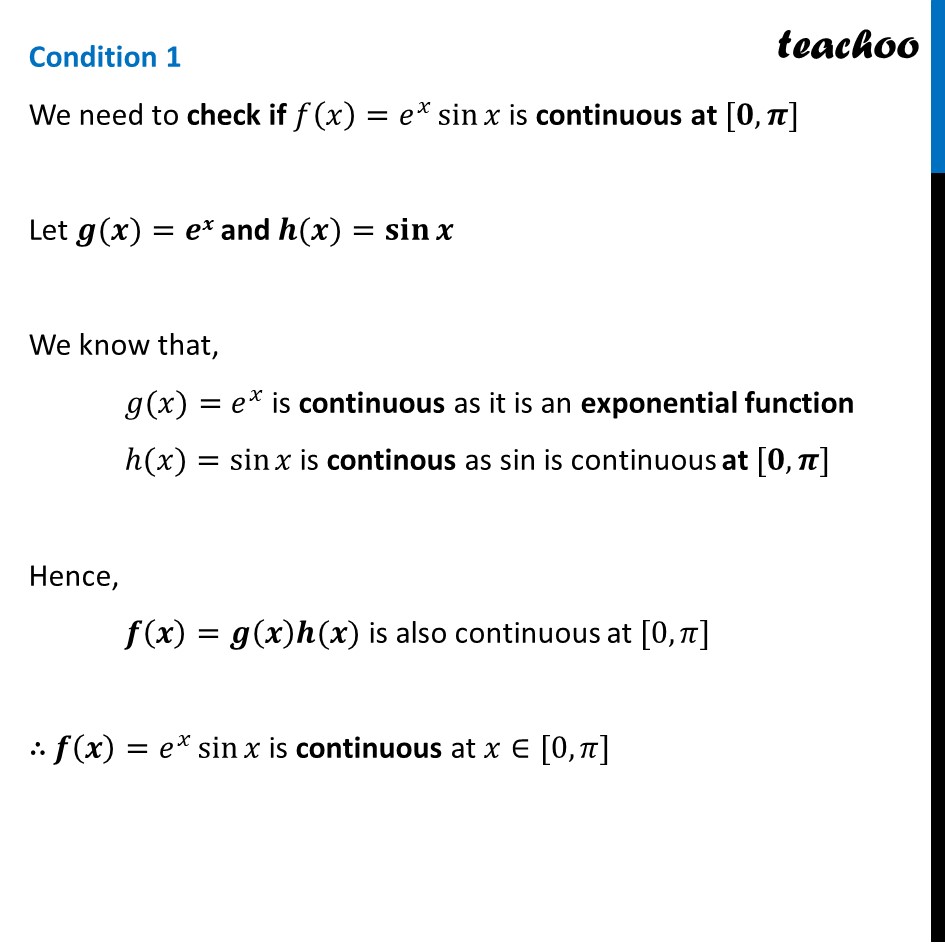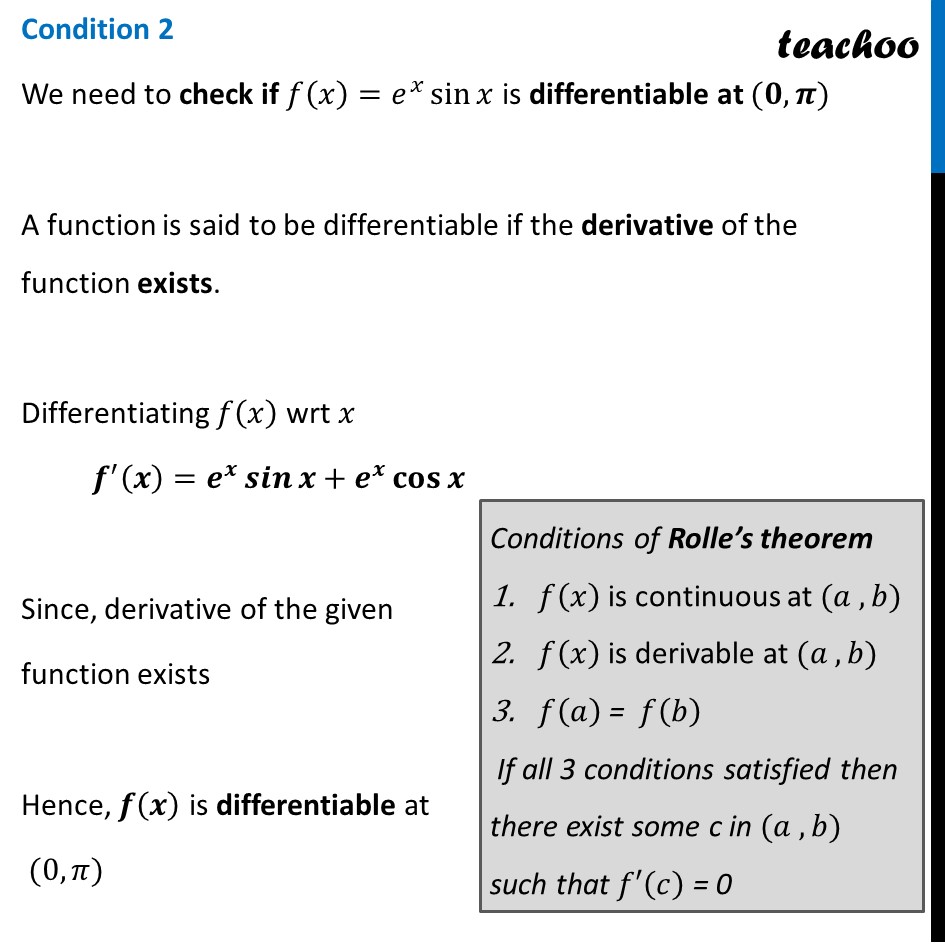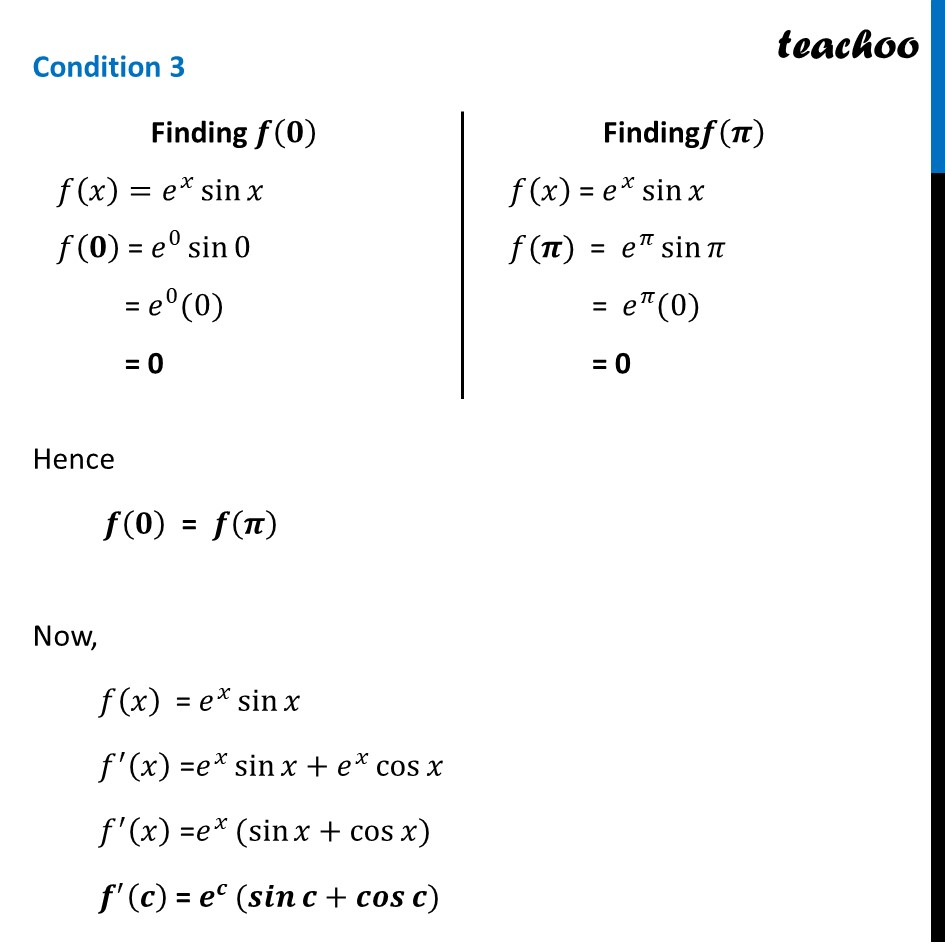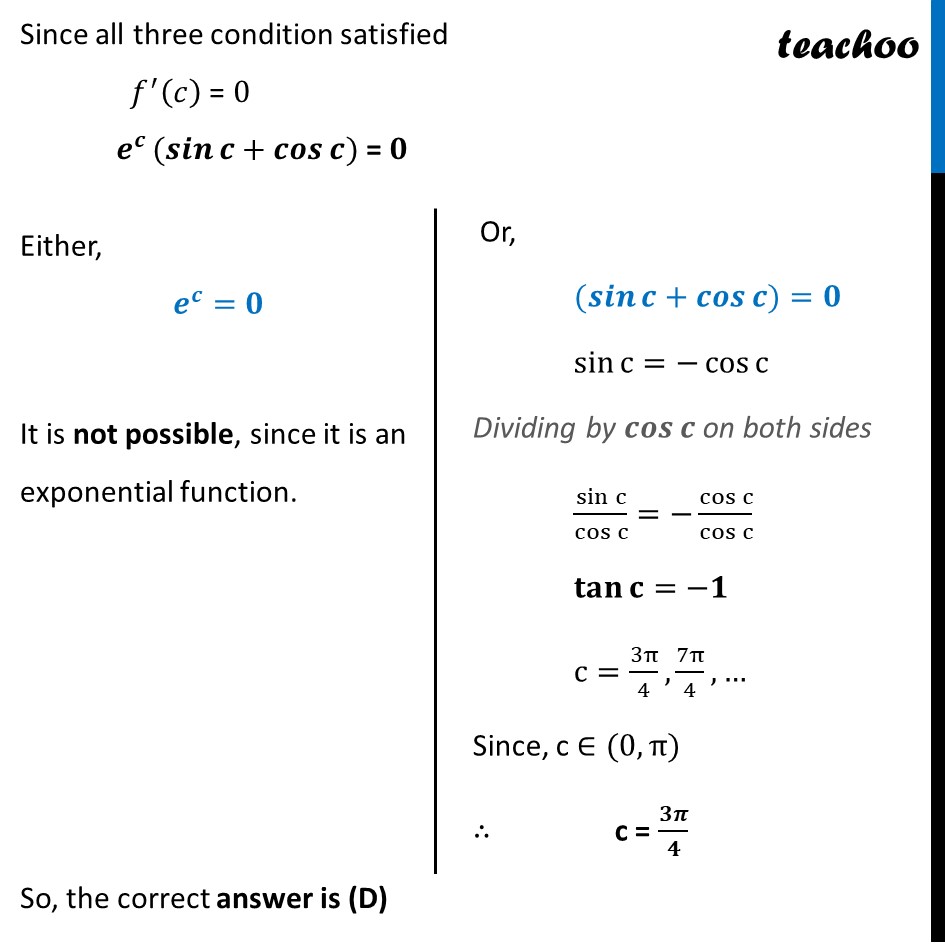The value of c in Rolle’s Theorem for the function f (x) = e^x sin x,
x∈ [0, π] is
(A) π/6 (B) π/4
(C) π/2
(D) 3π/4
This question is similar to Ex 5.8, 1 - Chapter 5 Class 12 - Continuity and Differentiability
![[MCQ] The value of c in Rolle’s Theorem for f(x) = 𝑒^𝑥 sin 𝑥, x ∈ - NCERT Exemplar - MCQs](https://cdn.teachoo.com/5e376902-e196-43f9-977a-3fb19813a792/slide51.jpg)




NCERT Exemplar - MCQs
Last updated at December 16, 2024 by Teachoo
This question is similar to Ex 5.8, 1 - Chapter 5 Class 12 - Continuity and Differentiability
![[MCQ] The value of c in Rolle’s Theorem for f(x) = 𝑒^𝑥 sin 𝑥, x ∈ - NCERT Exemplar - MCQs](https://cdn.teachoo.com/5e376902-e196-43f9-977a-3fb19813a792/slide51.jpg)




Transcript
Question 1 The value of c in Rolle’s Theorem for the function f (x) = 𝑒^𝑥 sin 𝑥, 𝑥∈ [0, 𝜋] is (A) 𝜋/6 (B) 𝜋/4 (C) 𝜋/2 (D) 3𝜋/4 𝑓 (𝑥)= 𝑒^𝑥 sin〖𝑥, 𝑥 ∈ [0,𝜋] 〗 First, we will check if the conditions of Rolle’s theorem are satisfied Condition 1 We need to check if 𝑓(𝑥)=𝑒^𝑥 sin〖𝑥 〗is continuous at [𝟎,𝝅] Let 𝒈(𝒙)=𝒆𝒙 and 𝒉(𝒙)=𝐬𝐢𝐧𝒙 We know that, 𝑔(𝑥)=𝑒^𝑥 is continuous as it is an exponential function ℎ(𝑥)=sin𝑥 is continous as sin is continuous at [𝟎,𝝅] Hence, 𝒇(𝒙)=𝒈(𝒙)𝒉(𝒙) is also continuous at [0,𝜋] ∴ 𝒇(𝒙)=𝑒^𝑥 sin𝑥 is continuous at 𝑥∈[0,𝜋] Condition 2 We need to check if 𝑓(𝑥)=𝑒^𝑥 sin𝑥 is differentiable at (𝟎,𝝅) A function is said to be differentiable if the derivative of the function exists. Differentiating 𝑓(𝑥) wrt 𝑥 𝒇^′ (𝒙)=𝒆^𝒙 𝒔𝒊𝒏𝒙+𝒆^𝒙 𝐜𝐨𝐬𝒙 Since, derivative of the given function exists Hence, 𝒇(𝒙) is differentiable at (0,𝜋) Finding 𝒇(𝟎) 𝑓(𝑥)=𝑒^𝑥 sin𝑥 𝑓(𝟎) = 𝑒^0 sin0 = 𝑒^0 (0) = 0 Finding𝒇(𝝅) 𝑓(𝑥) = 𝑒^𝑥 sin𝑥 𝑓(𝝅) = 𝑒^𝜋 sin𝜋 = 𝑒^𝜋 (0) = 0 Condition 3 Hence 𝒇(𝟎) = 𝒇(𝝅) Now, 𝑓(𝑥) = 𝑒^𝑥 sin𝑥 𝑓^′ (𝑥) =𝑒^𝑥 sin𝑥+𝑒^𝑥 cos𝑥 𝑓^′ (𝑥) =𝑒^𝑥 〖(sin〗𝑥+cos𝑥) 𝒇^′ (𝒄) = 𝒆^𝒄 〖(𝒔𝒊𝒏〗𝒄+𝒄𝒐𝒔𝒄) Since all three condition satisfied 𝑓^′ (𝑐) = 0 𝒆^𝒄 〖(𝒔𝒊𝒏〗𝒄+𝒄𝒐𝒔𝒄) = 𝟎 Either, 𝒆^𝒄=𝟎 It is not possible, since it is an exponential function. Or, 〖(𝒔𝒊𝒏〗𝒄+𝒄𝒐𝒔𝒄)=𝟎 sinc=−cosc Dividing by 𝒄𝒐𝒔𝒄 on both sides sinc/cosc =−cosc/cosc 𝐭𝐚𝐧〖𝐜=−𝟏〗 c=3π/4, 7π/4, … Since, c ∈(0,π) ∴ c = 𝟑𝝅/𝟒 So, the correct answer is (D)